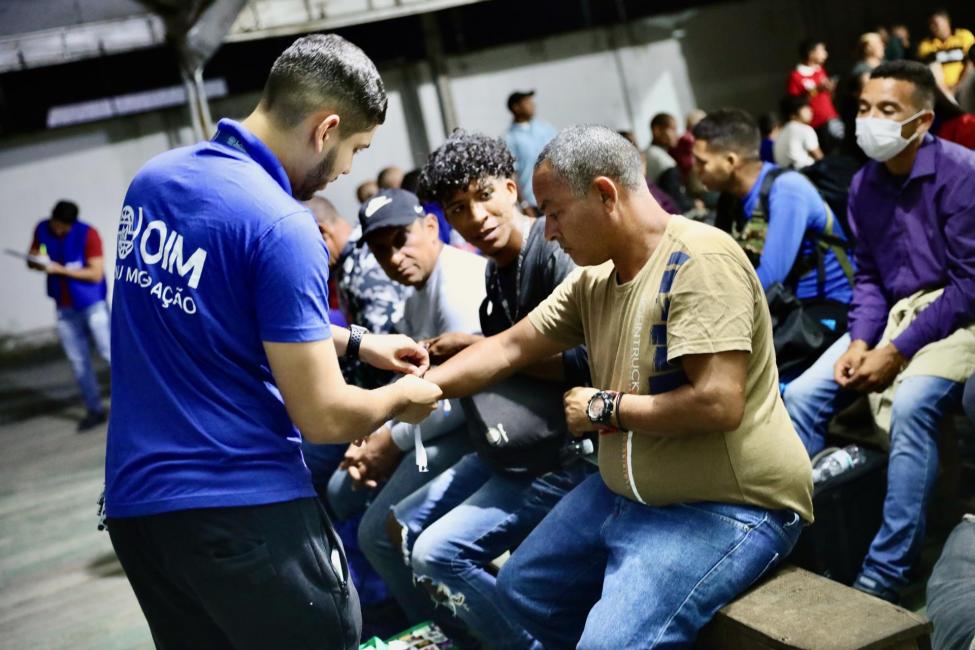-
Who we are
WHO WE AREThe International Organization for Migration (IOM) is part of the United Nations System as the leading inter-governmental organization promoting since 1951 humane and orderly migration for the benefit of all, with 175 member states and a presence in 171 countries.
-
Our Work
Our WorkAs the leading inter-governmental organization promoting since 1951 humane and orderly migration, IOM plays a key role to support the achievement of the 2030 Agenda through different areas of intervention that connect both humanitarian assistance and sustainable development.
What We Do
What We Do
Partnerships
Partnerships
- Where we work
-
Take Action
Take Action
Work with us
Work with us
Get involved
Get involved
- Data and Research
- 2030 Agenda
After 5 Years, Brazil Relocation Strategy Benefits Over 100,000 Venezuelans
Geneva – Brazil’s strategy of voluntarily relocating Venezuelan refugees and migrants from the border state of Roraima to other Brazilian cities has benefitted over 100,000 people since it was launched five years ago, according to Brazil’s Ministry of Social Development and Assistance, Family and the Fight Against Hunger.
This total represents nearly a quarter of the 425,000 Venezuelans living in Brazil. Individuals and families have been relocated from Roraima to more than 930 cities throughout the huge country, where they can find better opportunities to significantly improve their quality of life, make a greater contribution and achieve autonomy and integration. Women and children account for roughly 80 per cent of the beneficiaries.
A survey conducted in 2021 among 2,000 Venezuelans who were part of the initiative found that they had better access to formal jobs, housing, and education programmes after being relocated and eight out of ten adults had found employment or started their own businesses.
“The relocation strategy guarantees protection and inclusion, providing effective ways for Venezuelans in the country to restart their lives with dignity,” said Davide Torzilli, UNHCR Representative in Brazil. “Based around close collaboration between various institutions and organizations, the strategy represents an effective solution and a model for the region and beyond."
Before heading to other cities, Venezuelans who voluntarily participate in the relocation strategy receive proper documentation, including a national work permit and an entry in the Individual Taxpayer Registry (CPF). They are also duly vaccinated according to the national immunization schedule.
“Strengthening and improving inclusion through the relocation strategy is crucial for those who have decided to stay in Brazil,” said IOM Brazil’s Chief of Mission, Stéphane Rostiaux. “With the support of local governments, civil society organizations and the private sector, it is possible to promote long-lasting inclusion, allowing Venezuelans to break stereotypes, create solutions and contribute to the development of host communities.”
The strategy, known as “interiorization,” was launched in 2018 as part of Operação Acolhida (Operation Welcome), the Brazilian Government’s humanitarian response to the arrival of Venezuelan refugees and migrants. It offers a lifeline and fosters integration by helping people find new job opportunities or reunite with family or friends in other parts of the country.
The relocation strategy and Operação Acolhida are supported by the Interagency Coordination Platform for Refugees and Migrants from Venezuela (R4V), which is co-led by the International Organization for Migration (IOM) and UNHCR, the UN Refugee Agency, with the participation of 55 civil society organizations and other UN agencies in Brazil. Municipalities receiving the relocated Venezuelans also support the initiative.
***
For more information, please contact:
In Panama:
Gema Cortes, IOM, marcortes@iom.int +507 62694574
William Spindler, UNHCR, spindler@unhcr.org +507 6382 7815
Luiz Fernando Godinho, UNHCR, godinho@unhcr.org +507 6356 0074
In Brazil:
Juliana Hack, IOM, jhack@iom.int +55 61 37713772
Miguel Pachioni, UNHCR, pachioni@unhcr.org +55 11 98875 3256
In Geneva:
Diego Perez Damasco, IOM, dperez@iom.int +41 795 827 235
Olga Sarrado Mur, UNHCR, sarrado@unhcr.org +41 797 402 307
